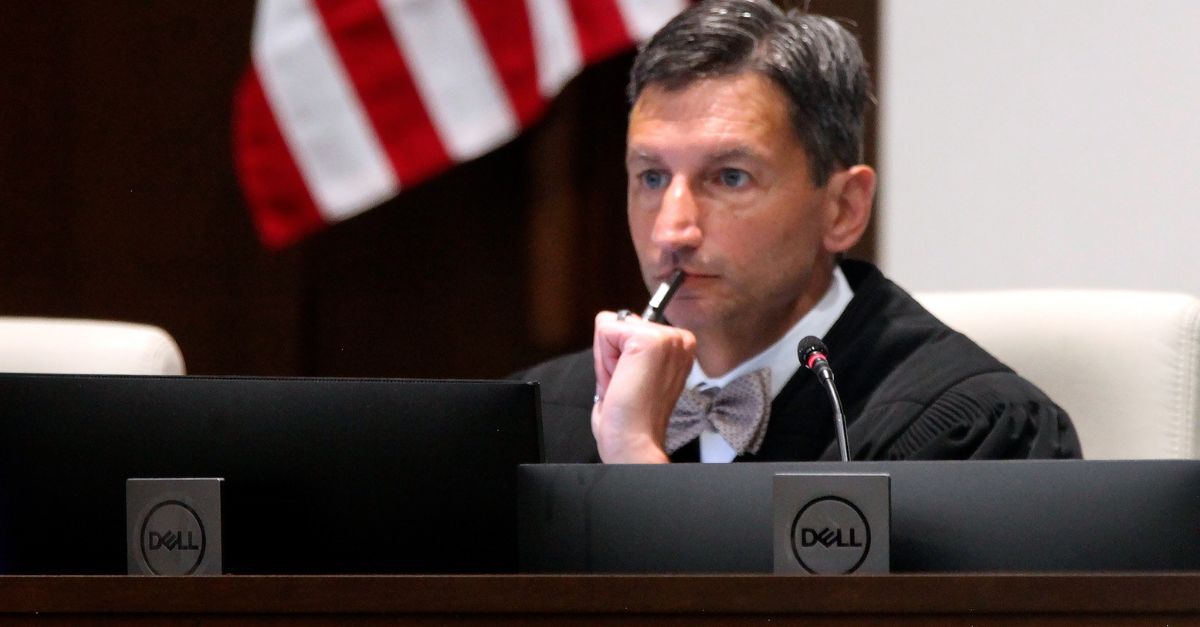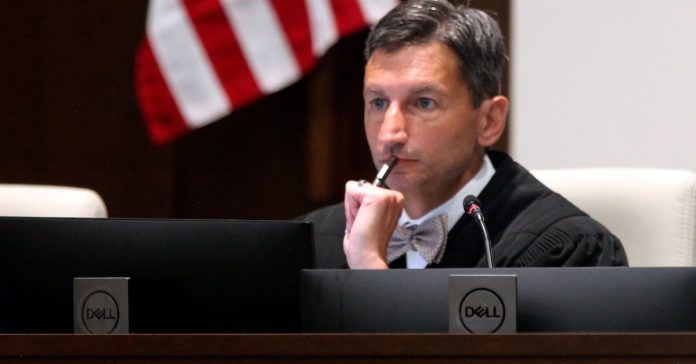
Kansas Judge K. Christopher Jayaram follows arguments from attorneys as they argue over a new state law on how providers dispense abortion medications in Johnson County District Court, Tuesday, Aug. 8, 2023, in Olathe, Kan. (AP Photo/John Hanna)
A Kansas judge blocked an “abortion reversal” law Monday, ruling that the state’s requirement that doctors advise patients about the possibility of “reversing” a medication abortion is a free speech violation based on junk science that turns the informed consent process upside down and makes patients “likely to be less informed—not more.”
The ruling blocks portions of a longstanding set of abortion regulations, including the 24-hour waiting period, plus a new requirement that providers recite a script that informs patients that medication abortions can be “reversed.” The claim that an abortion conducted through the use of Mifepristone — the first pill in a commonly-used two-medication abortion regimen — can be “reversed” through doses of other drugs is not accepted science with the medical industry.
Judge K. Christopher Jayaram, a judge appointed by Democratic Gov. Laura Kelly in 2021, issued the 92-page ruling on Monday in the case of Hodes & Nauser v. Kobach. The lawsuit involves the 1997 “Woman’s-Right-to-Know” Act, which requires doctors to obtain written proof of a patient’s informed consent within 24 hours before having an abortion. The original law required an extensive list of specific points that doctors were required to cover with their patients. Over the next decade, the act was amended multiple times, each iteration adding to the exhaustive mandates required of doctors.
In 2023, after the U.S. Supreme Court struck down Roe v. Wade, the Kansas legislature adopted H.B. 2264, an amendment known as the “Medication Abortion Reversal” Amendment.
The amendment, passed over Kelly’s veto, required that a number of warnings and offers of “reversal” be given to anyone seeking a medication abortion. It further required that a “conspicuous sign” be posted at private offices, freestanding clinics, pharmacies, and anywhere else mifepristone is dispensed, as follows:
NOTICE TO PATIENTS HAVING MEDICATION ABORTIONS THAT USE MIFEPRISTONE: Mifepristone, also known as RU–486 or mifeprex, alone is not always effective in ending a pregnancy. It may be possible to reverse its intended effect if the second pill or tablet has not been taken or administered. If you change your mind and wish to try to continue the pregnancy, you can get immediate help by accessing available resources.
The law created a $10,000 per day penalty for violations of the signage requirement and allowed for doctors to be criminally prosecuted. Additionally, the act mandates that non-compliance constitutes “unprofessional conduct” for purposes of medical licensing.
The judge’s ruling Monday blocked enforcement of the law on the grounds that it likely violates both state and federal law.
Jayaram reasoned that, “Because a woman’s right to bodily autonomy (including her right to decide whether to terminate or continue a pregnancy) is fundamental,” and because the doctor-patient relationship is “intimate and intensely-personal,” the law fails under standards set out under the Kansas State Constitution.
Likewise, he said that despite any “specific moral, ethical, or spiritual concerns” that might weigh in favor of the law, the law appears a clear violation of the First Amendment.
Jayaram listed a number of relevant facts in his ruling: that abortion is a common procedure and statistically safer than carrying a pregnancy to term, that the majority of women who have abortions have already given birth to other children, that nearly all abortions in Kansas are performed early in pregnancy, and that women typically invest significant time, research, discussion, and thought prior to making an appointment for an abortion.
Furthermore, Jayaram said, doctors go through a robust discussion process with patients as part of standard medical practice. Requiring that they advise patients about abortion “reversal” is dangerous and misleading, the judge said:
There is no credible scientific/medical evidence that the “reversal” therapy proposed in the Amendment actually “reverses” the effects of mifepristone. Indeed, the overwhelming weight of credible evidence, given this record, suggests that such a theory is misleading, untested, potentially-dangerous for women, and speculative.
The judge also called out the state’s witnesses for offering evidence in support of “reversal” that was “not credible or grounded in established and appropriately peer-reviewed and validated science.”
Jayaram reminded that it is already well-established law that the Kansas Constitution’s Bill of Rights protects “the right to control one’s own body, to assert bodily integrity, and to exercise self determination” as a fundamental right which is “separate, distinct, and broader than the protections contemplated under the United States’ Constitution.” As a result, an infringement on the right to terminate a pregnancy is subject to strict scrutiny: valid only if narrowly tailored to achieve a compelling governmental interest — and this act does not.
Although the 2022 Dobbs v. Jackson decision eradicated a right to abortion itself under the U.S. Constitution, the right to free speech under the First Amendment remained unchanged by the ruling. Jayaram concluded therefore that under standard First Amendment jurisprudence, H.B. 2264 is as an unconstitutional violation of free speech.
The judge reasoned that through the act, Kansas is “‘wedging’ its way into the physician-patient relationship…[and] infring[ing] on a woman’s fundamental right to bodily autonomy.” He said that requiring doctors to make statements about abortion “reversal,” “invades that physician-patient relationship,” and, “places a figurative ‘thumb’ on the decision-making scale by advocating for the State’s preferred message and outcome.”
Jayaram said the act’s invasiveness goes even beyond interference and requires illegally compelled speech without a valid purpose. Plus, he pointed out, subjecting patients to a deluge of unnecessary communications can actually thwart the informed consent process.
He wrote:
By overwhelming patients with information other than that strictly necessary to reach an informed decision on the procedure at issue, both orally and in writing in multiple locations at multiple times, the significance of the material medical information conveyed appears likely to be diluted, and the consent seems potentially likely to be less informed — not more.
Jayaram concluded his lengthy decision with an acknowledgment that “Reasonable minds can and do, unquestionably, diverge as to the propriety and permissibility of terminating a pregnancy.”
“This Court is deeply aware of the strongly-held and very personal beliefs on both sides of these issues,” he continued, but qualified that the court “will not, and need not wade into such ideologic debates” to analyze the legality of Kansas’ law.
The judge warned that Kansas’ right to legislate “pursuant to its own moral scruples” is limited by the guarantees the state itself adopted in its constitution.
Traci Lynn Nauser, the board-certified obstetrician and gynecologist who is one of the plaintiffs in the case, reacted to the ruling in a statement Monday:
This ruling represents a hard-fought win for our patients all across Kansas and in neighboring states where abortion is banned. While there is still a long road ahead to ensure that Kansans are able to access timely abortion care without facing barriers, we are grateful that we can continue to provide accurate, patient-centered information to those who trust us with their care.
Anti-abortion group Kansans for Life criticized the ruling as “a nightmare for women and a dream come true for the profit-driven abortion industry.”
You can read the full ruling here.
Have a tip we should know? [email protected]

